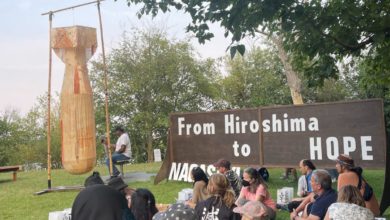This article is part of Liberation’s commemoration of Black History Month, 2021.
Katie Barton was a tireless and militant Black activist in her community of Tri-Cities, Washington. In what became her life’s work towards fair treatment and equal rights for Black people, Katie Barton played a significant role in taking down the Jim Crow style “No blacks after dark” sign that once hung on the bridge that connected East Pasco to its “sundown town” sister-city Kennewick.
“Mother-Katie Barton, she stayed on it all the time. And she was the one that took that sign off that bridge.”
Marion Keith Barton (Hanford History Project)
Katie Barton selflessly and seemingly tirelessly dedicated her life to working against the system that was so oppressive to her community. She was instrumental in improving the lives in her neighborhood and in helping to desegregate the communities of Tri-Cities, Washington.
Katie Barton was 30-years old when she made the trip from her home in Liberty, Texas to Pasco, Washington in 1948. Mrs. Barton was under the common misconception that she would find a reprieve from the segregation she knew all too well from the South, but what she found in her new home in the Pacific NorthWest was in many ways an even more oppressive state than what she’d left.
Mrs. Barton claimed that even in the Jim Crow South “the relationship between Blacks and whites in Texas was reasonably harmonious.” So when she arrived in Pasco she was not expecting the hostile and racist attitudes she received from the white residents of Tri-Cities. Katie Barton was astonished by the bigotry in her new home.
Segregation and anti-Black rhetoric were rampant. From the “gentlemen’s agreements” among local real estate agents — agreeing to refuse to sell or rent to Black people anywhere but East Pasco — to a lack of public transportation, to businesses refusing to serve Black residents, to the menial types of jobs Black people were able to get hired onto, white supremacist oppression existed in almost every aspect of the lives of the Black residents of Tri-Cities.
According to her son Marion Keith Barton, Mrs. Barton would say that Kennewick was so “lily white” and racist that a “Black person couldn’t even get arrested there.”
She’d go on to describe the story of a Black man she knew who was arrested in Kennewick for a petty offense. Instead of the local police following procedure and putting him in a Kennewick Police Department jail cell, the Kennewick police left the man outside, cuffed to a pole, called the Pasco Police Department and told them to “Come get him. Come get your N-word.” (Hanford History Project)
After witnessing family and friends mistreated and harassed by local police and business owners, Katie Barton became extremely active in her community, specifically within her church and in civil rights work. Involving herself in a number of organizations including the local NAACP branch, the Citizens Advisory Council for the Pasco Senior Citizens Center and the Community Action Council, she ingrained herself into her community.
Mrs. Barton was also President of the East Pasco Neighborhood council, and was the first recipient of the Martin Luther King Jr. Spirit Award. Katie Barton’s persistence and her “didn’t take no stuff” spirit are obvious in the work she was able to get accomplished, despite pushback from the city of Pasco, which was not interested in improving the lives of its Black residents.
Mrs. Barton successfully campaigned to have sewer service provided to her East Pasco neighborhood, the last neighborhood left without service. She fought to get both sidewalks and paved streets put into East Pasco, making the area a safer place for everyone.
Among many other accomplishments, Mrs. Barton was the first Black woman elected to the Pasco City Council in 1969, and was only the second Black person to have ever been elected. She was on the council that voted to have the Cable Bridge installed, where she is honored with a plaque.
“My Mom, she wanted to see equal rights for the community, not just herself”
Marion Keith Barton (Hanford History Project)
In a time when many residents, for their own safety and livelihood, didn’t want to “stir the pot,” Katie Barton wasn’t afraid to make herself heard. When Mrs. Barton saw a need she set out to fill it and “She’d talk to anyone” to get it accomplished, no matter how impossible the task seemed.
Sources:
Hanford History Project interview with Marion Keith Barton
The wounds of a racist history don’t heal themselves
Racial discrimination and protests have long history in Tri-Cities





